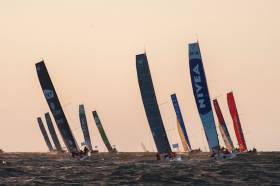Displaying items by tag: Brest
Plymouth No Longer Host Of Transat 2020 Start As Race Moves Across The Channel To Brest
The next edition of The Transat will now start in the French port city of Brest instead of Plymouth, race organisers have announced.
Plymouth on the Devon coast was originally confirmed over a year ago as the start venue for the 2020 edition of the four-yearly event, the first and oldest single-handed transatlantic race in history.
No explanation has been given for the switch away from Britain’s Ocean City, other than race owners and organisers OC Sport Pen Duick saying that the change comes as it looks “for innovative ways to secure the future of The Transat”.
“We are really pleased to be partnering with Brest for The Transat, and together we share a strong desire to continue developing the race in 2020 and beyond,” OC Sport CEO Hervé Favre said.
“We have seen from races such as the Route du Rhum-Destination Guadeloupe [also owned by OC Sport Pen Duick] just how engaged the French public are with offshore sailing where we had over two million visitors to the race village.
“Staging the start from Brest is a real opportunity for our sponsors and the teams to capitalise on this captive audience and we expect it to open up many new commercial opportunities which are essential to guarantee the longevity of the race. I’d like to thank Plymouth for their support of the race up until this point.”
The Transat will celebrate its 60th anniversary when the world’s top solo sailors gather to race 3,500 nautical miles across the North Atlantic this time next year.
While the race was born in the UK, its organisers say it has always attracted the French elite of offshore sailing, who in recent years have dominated the race.
Last year Plymouth was also the focus of rumours that it might lose out as the traditional start of the Rolex Fastnet Race to a French port, though that speculation was swiftly shot down by the RORC which said it was working to make the Plymouth start even “bigger and better”.
Lee Looks Ahead to All Antarès Arrival
A trio of French Naval mine-route survey craft are to sail upriver of the River Lee this Friday and are to berth in the Port of Cork at the North Custom House Quay, writes Jehan Ashmore.
The craft BRS Antarès (M 770), BRS Altaïr (M 771) and BRS Aldébaran (M 772) represent all of the three-ship Antarès-class which are based in the Breton naval base of Brest. At 28m long the rather stout-looking craft (photo) weigh some 250 tonnes displacement and have a crew of 23.
Leadship of the class BRS Antarès entered service in 1993 and was followed by the remaining pair which too were built by Chantier (Socarenam) in Boulogne-sur-Mer.
In March the BRS Altaïr accompanied the minehunter CMT Cassiopée (M642) to Dublin for a four-day visit during the St. Patrick's Day festival.
Preparing for the Challenge of La Solitaire du Figaro
Dubliner Paul O'Riain's comprehensive article on his Figaro debut experience in 2007 has moved, Click this link for it and the latest La Solitaire du Figaro news.


























































